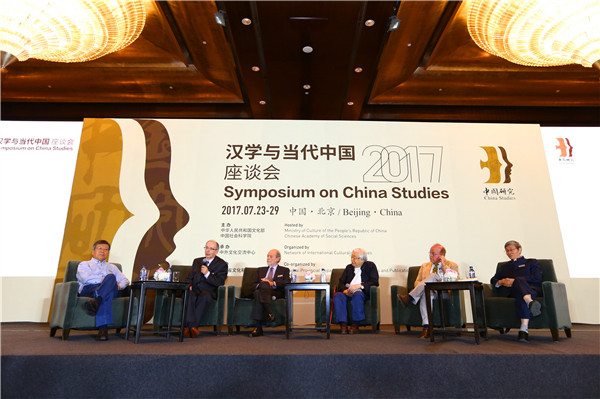Chinese, foreign experts talk of shared values of Silk Road program
Putting onions and carrots together will make soup both delicious and nutritious.
|
Experts from home and abroad attend the 2017 Symposium on Chinese Studies in Beijing to discuss the global influence of the Belt and Road Initiative. [Photo/China Daily] |
This is an interpretation of harmony-the Confucian philosophy that is at the core of the Chinese civilization-which is also the spirit behind China's cooperation with other countries, big and small, especially with regard to the Belt and Road Initiative, Thaddeus Metz, a professor of philosophy and religion with the University of Johannesburg in South Africa, said in a speech at the 2017 Symposium on Chinese Studies earlier this week.
Co-hosted by the Ministry of Culture and the Chinese Academy of Social Sciences first in 2013, the symposium has been aiming to build a professional platform for exchange of thoughts among scholars from home and overseas.
This year, 26 experts on China studies and international relations from 22 countries joined 20 Chinese scholars to exchange ideas on the theme: the Belt and Road Initiative in global view.
"We can also find the Confucian thought of 'harmony' in the win-win cooperations, that is, two very different sides work together to do a project that will benefit both sides," says Metz.
Metz was one of many speakers who dug out Chinese mainstream ancient thoughts to interpret the cooperation mode under the Belt and Road Initiative.
"For thousands of years, Chinese people have talked about the concept of 'land under heaven'. For Chinese people, harmony on the land under heaven is built on compassion, to love and respect anyone in the world fairly," says Wang Keping, a researcher on aesthetics with the Chinese Academy of Social Sciences.
"Now through the Belt and Road Initiative, we also have the fundamental principles for sustainable development for mutual benefit, openness and tolerance," he says.
Liu Mengxi, director of the Institute of Chinese Culture at the Chinese National Academy of Arts, talked about the classic Confucian thought "do unto others as you would have them do unto you" to explain China's relations with the world today, especially when China is the world's second-largest economy with an increasing influence that may worry many other countries.
Modern China is responsible not only for its own destiny but is likely to influence the whole world, says Ismatulla Bekmuratov, dean of the faculty of world policy, history and philosophy at Tashkent State Institute of Oriental Studies.
"But China firmly refuses to impose its own development mode on other countries."
China will not impose its own values on other countries, either, as many speakers agreed, but will respect diversity in different cultures.
Yuan Zhengqing, who studies China's diplomacy at the Chinese Academy of Social Sciences, says that in the 5,000-year development of Chinese civilization, Chinese people have pursued peace and harmony. The rule of the Yuan Dynasty (1271-1368) was an exception, he says.
"So while we pursue the development of our own country, China will also care about the interests of others," he says. "China wants to promote dialogue among different cultures."
Martin Albrow, fellow of the Academy of Social Sciences in Britain, talks about how some predictions in the 1970s by a sociologist from Harvard University did not happen.
"He said the world would be governed by theory. This has not happened in the West. I would suggest to you that it is happening in China, one of the most important contributions that China is making to the world today is generating a new theory for the world we are going to live in," he says.
If sharing values is emphasized, we need to understand the diversity of ideas.
"We have to work toward creating common values. This is how the Belt and Road Initiative can work in practice."
